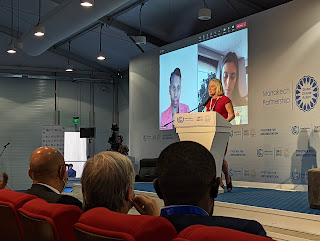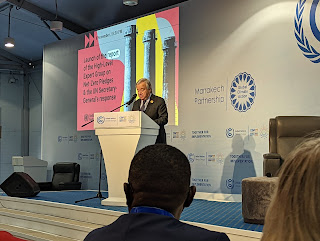The report cracks down on greenwashing and weak net zero pledges that threaten to undermine global efforts to reduce greenhouse gas emissions in line with limiting warming to 1.5 degrees.
Non-state entities are all the regional and local governments, corporations and smaller businesses who all have a carbon footprint and need to address their greenhouse gas emissions.
The Honourable Catherine McKenna, chair of the UN-appointed expert group and former Canadian Minister of Environment and Climate Change as well as Minister of Infrastructure, said the report provides a crucial roadmap to bring integrity to net zero commitments by industry, financial institutions, cities and regions and to support a global, equitable transition to a sustainable future.
“We must have zero tolerance for net-zero greenwashing,” said the Secretary-General at the launch of the Group’s report at the UN Climate Conference (COP27) at Sharm el-Sheikh, Egypt, on 8 November 2022. Calling the report “a how-to guide to ensure credible, accountable net-zero pledges,” he explained that it provides clarity in four key areas – environmental integrity, credibility, accountability, and the role of governments.
“Solving the climate crisis requires strong political leadership. I urge all government leaders to provide non-state entities with a level playing field to transition to a just, net-zero future,” added the Secretary-General.
The report is the result of intense work and consultations over seven months and reflects the best advice of 17 experts appointed by the UN Secretary-General. It sets out ten practical recommendations to bring integrity, transparency and accountability to net zero by establishing clear standards and criteria.
“After consulting with hundreds of individuals and organizations and incorporating the latest research and science, we have a roadmap to ensure that net zero commitments by industry, financial institutions, cities and regions are ambitious, transparent and credible,” McKenna said.
“This is about cutting emissions, not corners. Our roadmap provides clear standards and criteria that must be followed when developing net zero commitments. Right now, the planet cannot afford delays, excuses, or more greenwashing.”
The report calls on these non-state actors to commit to immediate reductions in absolute emissions across its value chain with short, medium and long term science-based targets. Detailed transition plans must show immediate emissions reductions and capital expenditures must be aligned with these targets and the non-state actor’s net zero pathway.
To prevent dishonest climate accounting and other actions designed to circumvent the need for deep decarbonization, non-state actors must report publicly on their progress with verified information that can be compared with peers.
The report also put down new redlines that are intended to prevent greenwashing. It recommends that non-state actors can no longer:
- Claim to be net zero while continuing to build or invest in new fossil fuel supply. Similarly, deforestation and other environmentally destructive activities are disqualifying.
- Buy cheap credits that often lack integrity instead of immediately cutting their own emissions across their value chain. High-quality credits should only be used to balance out all remaining emissions once a non-state actor is meeting its short and medium-term targets.
- Focus on reducing the intensity of their emissions rather than their absolute emissions or tackling only a part of their emissions rather than their full value chain (scopes 1, 2 and 3).
- Lobby to undermine ambitious government climate policies either directly or through trade associations or other bodies. Instead they must align their advocacy, as well as their governance and business strategies with their climate commitments. This includes aligning capital expenditures with net zero targets and linking executive compensation to climate action and proven results.
The report also recommends that to effectively tackle greenwashing and ensure a level playing field, non-state actors need to move from voluntary initiatives to regulated requirements for net zero. The report suggests starting with large corporate emitters, including requiring that their pledges are assured and that they report annually on their progress.
The report comes in a year in which the world was beset by an energy crisis triggered by Russia’s invasion of Ukraine and devastating climate impacts like the flooding in Pakistan and drought in the US. By accelerating the shift from fossil fuels towards clean energy, we are building a more secure and sustainable future.
“No one can ignore the need to immediately and drastically cut emissions. If industry, financial institutions, cities and regions mean what they say in their net zero pledges, they will adopt these recommendations,” expert group member and climate scientist Bill Hare, CEO of Climate Analytics said. “If fossil fuel companies think that they can expand production under a net zero target, they need to think again.”
Watch the launch at COP27:
Centre for International Environmental Law reviewed the report arguing the many positives, but also some negatives.
The HLEG unambiguously calls for an immediate halt to fossil fuel expansion; phaseout of coal, oil, and gas in alignment with a 1.5° no or low overshoot pathway; and an end to deforestation. Its emphasis on deep emissions cuts now leaves no room for reliance on speculative carbon dioxide removal technologies or other risky geoengineering measures. Despite these important recommendations, HLEG’s encouragement of the use of carbon credits and offset markets run the risk of fueling rights violations and delaying emissions reductions, in a system with mounting evidence of fraud.
UN Secretary General's speech
Let me begin by thanking Catherine McKenna and the High-Level Expert Group.
Last year at COP26, I announced that I would establish a High-Level Expert Group to address net-zero commitments by non-State actors -- particularly businesses, financial institutions, cities and regions.
It was clear that we had a big gap in the climate space.
A growing number of governments and non-state actors are pledging to be carbon-free – and that’s good news.
The problem is that the criteria and benchmarks for these net-zero commitments have varying levels of rigor and loopholes wide enough to drive a diesel truck through.
We must have zero tolerance for net-zero greenwashing.
Today’s Expert Group report is a how-to guide to ensure credible, accountable net-zero pledges.
It provides clarity in four key areas: environmental integrity; credibility; accountability; and the role of governments.
I will briefly touch on each.
First, on environmental integrity, the Intergovernmental Panel on Climate Change is our scientific North Star.
Net-zero pledges must be in line with IPCC scenarios limiting warming to 1.5 degrees.
That means global emissions must decline by at least 45 per cent by 2030 – and reach net zero by 2050.
Pledges should have interim targets every five years starting in 2025.
And these targets must cover all greenhouse gas emissions and all scopes of emissions.
For financial institutions, this means all financed activities.
For businesses, it means all emissions -- direct, indirect and those originating from supply chains.
And for cities and regions, it means all territorial emissions.
The message is clear to all those managing existing voluntary initiatives – as well as CEOs, mayors, governors committing to net-zero:
Abide by this standard and update your guidelines right away – and certainly no later than COP28.
I also have a message to fossil fuel companies and their financial enablers.
So-called ‘net-zero pledges’ that exclude core products and activities are poisoning our planet.
They must thoroughly review their pledges and align them with this new guidance.
Let’s tell it like it is.
Using bogus ‘net-zero’ pledges to cover up massive fossil fuel expansion is reprehensible.
It is rank deception.
This toxic cover-up could push our world over the climate cliff.
The sham must end.
Second, on credibility, full and rapid decarbonization this decade is the ultimate test.
Leaders from business, financial institutions and local authorities need to present transition plans with their net-zero pledges.
These plans should be publicly available, with detailed, concrete actions to meet all targets.
Management must be accountable for delivering on these pledges.
This means publicly advocating for decisive climate action and disclosing all lobbying activity.
The absence of standards, regulations and rigor in voluntary carbon market credits is deeply concerning.
Shadow markets for carbon credits cannot undermine genuine emission reduction efforts, including in the short term.
Targets must be reached through real emissions cuts.
Fossil fuels must be phased out and renewable energy scaled-up.
I thank the Group for providing clarity and details on what businesses, financial institutions, and sub-national authorities need to do to phase-out coal, oil and gas.
As fossil fuel finance is scaled down, climate finance for renewable energy should be scaled up.
Private financial institutions must now fully facilitate investments for a renewable energy revolution, and proactively work with international finance institutions to address issues of cost of capital and risk perceptions.
At the same time, the transition to net-zero must be just.
Transition plans should address the needs of workers in fossil fuel industries and sectors affected by the renewable energy transition.
By the first half of 2023, all existing net-zero voluntary initiatives must explain how they will align and revise their standards accordingly -- and all new initiatives must abide by these recommendations.
My climate action team stands ready to assist in this process.
I also ask UN agencies working on developing, implementing, or in any way supporting voluntary pledges, to abide by these standards and criteria.
Third, on accountability, full transparency is critical.
The UNFCCC has a global and public platform -- the Global Climate Action Portal – that is already being used to register pledges, publish transition plans, and track annual reporting on implementation.
But it needs to be scaled up.
I call on all net-zero voluntary initiatives to accelerate efforts to standardize progress reports, in an open format and via public platforms that feed into the UNFCCC Portal.
Government or private sector commitments to net-zero cannot be a mere public relations exercise.
We must work together to fill gaps from the lack of universally recognized credible third-party authorities – and we must strengthen mechanisms positioned to conduct this verification and accountability process.
It is my deep belief that the UNFCC should play a decisive role – and I invite its Executive Secretary to present a plan early next year.
Fourth and finally, governments need to ensure that these voluntary initiatives become the “new normal”.
I urge all government leaders to provide non-state entities with a level playing field to transition to a just, net-zero future.
Solving the climate crisis requires strong political leadership.
The G20 -- together with all OECD countries – must accelerate the decarbonization of their economies and end their addiction and subsidies to fossil fuels.
This means they must rapidly regulate, design policies, pass legislation and approve budgets to limit warming to 1.5 degrees.
And I call on all other governments to build a net-zero regulatory environment to fit their needs and national circumstances.
I will closely follow the proposed Task Force on Net-Zero Regulations. I ask that its leadership and membership are as diverse and representative as this High-Level Group.
Once again, I thank the Group for their vital contributions.
You can count on us to help move to the net-zero future we need.
Thank you.
==========
Update: Already corporate use of carbon neutral, netzero targets is being raised as a result of this report. See my blog post from 13 November, Is the petrol in your car from Ampol really carbon neutral? 'Carbon-Neutral' Fossil Fuels & State-Sponsored Greenwashing.
Australian government and Federal corporate agencies like ASIC need to regulate claims of carbon neutrality, use of carbon offsets, and corporate claims of net-zero targets.
References:
- CIEL, 8 November 2022, UN Expert Group Affirms: ‘Net Zero’ is Incompatible with Fossil Fuels and Deforestation https://www.ciel.org/news/un-expert-group-affirms-net-zero-is-incompatible-with-fossil-fuels-and-deforestation/
- United Nations, 8 November 2022, High-Level Expert Group on the Net-Zero Emissions Commitments of Non-State Entities https://www.un.org/en/climatechange/high-level-expert-group
- United Nations’ High‑Level Expert Group on the Net Zero Emissions Commitments of Non-State Entities, 8 November 2022, Integrity Matters: Net Zero Commitments by Businesses, Financial Institutions, Cities and Regions https://www.un.org/sites/un2.un.org/files/high-level_expert_group_n7b.pdf
- Images courtesy Richie Merzian (twitter)



No comments:
Post a Comment